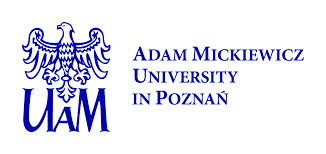Third Interlinguistics Symposium (25-26.09.2014)
In the photo: Third Interlinguistics Symposium AMU (2014)
Zbigniew Galor, Ilona Koutny and Marek Nawrocki, vice-rector of AMU, during the opening
Third Interlinguistic Symposium at AMU
The Third Interlinguistics Symposium took place September 25-26, 2014 in the Institute of Linguistics (Faculty of Modern Languages and Literatures) with the main theme Problems of International Communication and their Solutions. The symposium was opened by professor Marek Nawrocki, pro-rector of AMU. Paweł Nowakowski, vice-director of the Institute of Linguistics and Kajetan Pyrzyński, honorary consul of Peru also spoke.
In a time of globalization, international and intercultural communication is an everyday necessity. Therefore the symposium concentrated on the topics: What are scenarios for effective communication which also guarantee equality between partners? What are the costs and investments need to achieve it? How can people preserve and pass on their national cultural values and identity in a multicultural world? How can planned languages contribute to international communication? How does Esperanto bridge cultures?
There were 4 plenary and 34 regular papers in two sections in the three official languages: Esperanto, Polish and English. More than 60 % of the participants (about 70 people) were from outside Poland. The sections devoted to language policy featured papers on current issues in Ukraine, former Yugoslav states, Latvia and Wales. There were also papers on the influence of English on other languages as well as the psychological economy of the English language industry. Language use in Africa was also touched upon. The section on translation analyzed the problems of cultural transmission in translation.
The plenary presentation by Sabine Fiedler discussed tendencies in the literature on solutions to problems of international communication. The plenary presentation of István Ertl discussed applications and misapplications in the language policy of the EU. The question of whether Esperanto can be analyzed according to the criteria used for natural languages was discussed in the plenary presentations of Nicolau Dols Salas and Ilona Koutny.
Intercultural communication in Esperanto was a subject in many papers, which treated the abilities in the international community, between schools in different countries and in the family. There were papers on logic in languages, criticism of weak point in Esperanto and the mutual influence of Esperanto and various native languages. Other papers treated the classification of constructed languages, the transformation of the Bliss system from a planned language to a means of aiding the disabled. The example of Sanskrit was used to show that language planning took place thousands of years ago.
The program and summaries can be found on our website. Selected papers will appear in article form in the linguistic journal JKI (Language. Communication. Information) produced by the university.
The symposium was preceded by the first session of students of Post Graduate Interlinguistic Studies launched for the sixth time since 1998 in the Institute of Linguistics under the guidance of Ilona Koutny. Twenty-six students from 14 countries (7 from Brazil, 3 each from Spain and Poland, 2 each from Slovakia and Sweden and one each from Russia, Croatia, Iran, the Czech Republic, Hungary, the Netherlands, Belgium, France and the United Kingdom) began their three year course of studies.
______________
Here are two short interviews with guests who contributed both to the study session and symposium.
Sabine Fiedler (professor in the English department of Leipzig University, president of the German Interlinguistic Society):
What is interlinguistics all about?
"One problem in the field of interlinguistics is that the term 'interlinguistics' itself is understood and used differently. This was illuminated well by Szabolcs Szilva's symposium paper "Diversaj aliroj al la klasifiko de planlingvoj" 'Different approaches to the classification of planned languages', which presented the results of his thesis for the Post Graduate Studies in Poznan. According to the German Society for Interlinguistics (Gesellschaft für Interlinguistik e.V.), the object of study for interlinguistics is the entire range of international language communication (including linguistic, cultural and political aspects). The focus of interlinguistic studies is the structure and functioning of planned languages such as Esperanto."
Your English language plenary presentation was an overview on specialist literature in the area of international communication and planned languages. What role could Esperanto play in communication within the EU?
"Esperanto (like other planned languages) has not so far been truly successful in reaching the goal of making international communication easier on a large scale. Therefore, it's possible to expect that planned languages play no role in the specialist literature on language policy and linguistics. But that's not the case. It appears that researchers in that field cannot ignore the topic. There are discussions in the literature on the advantages of planned language use (such as equality, effectiveness and as aids in other language learning) as well as the disadvantages (low prestige, limited communication functions, the Eurocentric nature of Esperanto)' topics such as the existence of its own culture, the evolution of the language or the influence of native speakers are treated as subjects for debate. To answer the question: For communication in the EU at present, what's most important is not a particular language, either natural or planned, bur the preservation of multilingualism. Whether Esperanto can contribute to that (for example as a bridge language for translation as proposed by Robert Phillipson in his book English-only Europe? in 2003) is something that needs detailed study."
Your research also relates to phraseology in English and Esperanto and you've published books on both. Is it really possible to talk about phraseology in a planned language?
"Of course it is. Phraseology is made up of fixed expressions which a language puts at the disposal of users for use in specific situations. It's about groups of words or phrases which are stored as complete entities in people's memories. Every living language in use has them so Esperanto does as well. In addition, Esperanto phraseology is evolving in a similar manner as in ethnic languages. Some of it is taken from other languages, for example la nigra safo (black sheep) or formulas such as en nuksoselo (in a nutshell) that is, they are internationally known. Another part is related to life in a language community as is not easy to translate, for example Ne krokodilu! (lit. Don't crocodile, meaning Don't use another language (in Esperanto society)!), La nepoj nin benos (lit. The grandchildren will bless us, a quote from a poem by Zamenhof). The existence of this last mentioned part is proof of the living status and expressive power of the language, that is to say, for the culture of Esperanto."
Nicolau Dols Salas (professor and dean of the Balearic Islands University, member of the Institute of Catalan Studies):
You're a phonetician and phonologist. Does an international planned language like Esperanto have a fixed phonetic system? Is there a standard pronunciation?
"One of the common features of artificial languages is that they are usually planned on paper and do not come into existence orally, which is the opposite of "natural" languages which are born in the mouths of their speakers before they are ever put on paper. Diversity exists in the pronunciation of Esperanto. Nonetheless, understanding is not impeded because mutual understanding doesn't only depend on decoding the chain of sounds but also on context and other factors. On the other hand, the phonological system of Esperanto makes confusion difficult even for speakers from different language families."
Your plenary speech was about the flexibility and modernity of Esperanto. Could you explain very briefly what that is about?
"Modernization is the confluence of many aspects related to way of life: nutrition, clothing, routines, even aesthetics and things people like evolve towards unification not just within a specific country but also internationally. In every language there is a noticeable trend toward the loss of accents, especially in formal communication when, for example, people address others who they don't know as is done on television. Linguistic flexibility means leaving a large area of freedom for speakers, linguistic modernization must however reduce that freedom, although that doesn't require violence, but rather voluntary accommodation to respectable models."
Is English or Esperanto more suitable, from a phonetic standpoint, for the role of world language?
"From a phonetic viewpoint there are two important factors in this area. The first is the simplicity of the sound system and the second is the relation between writing and pronunciation. Esperanto has a completely regular writing system and for this reason it's possible to know how any word whatsoever is pronounced even if it has never been heard before or the meaning is unknown. This is not possible in English, which also has many more vowel colors than Esperanto with just five clear vowels. Phonetically it's easier to learn Esperanto than English..., but that's not enough to halt the very strong growth of English."
prepared by: Ilona Koutny, Ida Stria, Piotr Nowak,
The Institute of Linguistics, AMU
In the photo: Third Interlinguistic Symposium at AMU (2014) - Participants
Interlinguistic Studies

